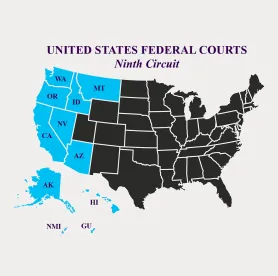On March 22, the Western District of Washington granted a motion to remand cases removed from state court in In re Fred Hutchinson Data Security Litigation, 2:23-cv-01893-JHC, 2024 WL 1240681 (W.D. Wash. March 22, 2024). In doing so, it highlighted for litigators and companies alike a lesson in the importance of understanding how courts determine citizenship when determining diversity jurisdiction under the Class Action Fairness Act (“CAFA”).
In re Fred Hutchinson results from a November 2023 data breach at Fred Hutchinson Cancer Center (“Fred Hutch”) in Seattle. Plaintiffs allege that due to the negligence of Fred Hutch and the University of Washington, cybercriminals accessed their data and, in many cases, sent them threatening messages. After their case was removed to federal court, Plaintiffs Irvine and Twaddell moved to remand, arguing that the Western District of Washington should abstain from exercising jurisdiction pursuant to the discretionary home-state exception to CAFA jurisdiction. Fred Hutch and other plaintiffs countered that the exception should not apply here because Irvine and Twaddell had not provided enough evidence for the court to decide that one-third of the putative class members were Washington citizens.
Holding for Irvine and Twaddle, the court found that “the last-known addresses [of recipients of data breach notifications from Fred Hutch] may provide rebuttable evidence of citizenship.”
The Class Action Fairness Act
Congress enacted CAFA in 2005 to expand federal diversity jurisdiction over class actions by adjusting the amount in controversy requirement to an aggregated five million dollars and by requiring only minimal geographic diversity, where “any class member is a citizen of a state different from any defendant.” See 28 U.S.C. § 1332(d). There are several statutory exceptions to CAFA jurisdiction, including –relevant here– the “home-state” exception. The “home-state” exception requires remand when “two thirds of the members of all proposed plaintiff classes in the aggregate, and the primary defendants, are citizens of the State in which the action was originally filed,” and permits remand when a district court determines “in the interests of justice and looking at the totality of the circumstances [. . .] more than one-thirdof the putative class and the primary defendants are citizens of the state where the action was originally filed.” In deciding if remand is appropriate, the district court must find that it is more likely than not that the requisite portion of the putative class and primary defendants are citizens of the state where the action was originally filed. The movant has the burden of providing “some facts in evidence” for the court to make this determination.
The most salient question in this case involved the citizenship of putative class members. Plaintiffs Irvine and Twaddle argued that the notice letters that Fred Hutch sent to former patients following the data breach served as prima facie evidence of class member citizenship. They reasoned that because 90% of these letters went to a Washington address, it was more likely than not that over one third of defendants were citizens of Washington. Fred Hutch disagreed and contended that (1) new data evinced that only about 66.41% of the letters were sent to a valid Washington address and (2) citizenship requires an individualized assessment of class members’ domicile, which comprises both residence and intent to remain in the state. Without an “individual inquiry” investigating intent to remain, Irvine and Twaddle failed to introduce evidence proving citizenship.
The court found for Irvine and Twaddle. Distinguishing a similar case cited by Fred Hutch involving events in Arizona,[1] the court found that there was not “a statistically significant portion of the greater Seattle area that is transient … so as to cast doubt on the validity of the last-known addresses in Washington.” Moreover, the court found that “at minimum, a person’s residence constitutes some evidence of domicile.” Adams v. West Marine Prods, 958 F.2d 1216, 1221 (9th Cir. 2020). Thus, it concluded that “last-known addresses may provide rebuttable evidence of citizenship.”
Conclusion
Given the rising threat of data breaches and the concomitant risk of class-action litigation related to these breaches, companies and litigators need to understand subject-matter jurisdiction under CAFA and its exceptions. In particular, courts disagree as to how to define citizenship under CAFA or as to what sort of evidence proves citizenship.[2] While the Seventh Circuit has held that “a court may not draw conclusions about the citizenship of class members based on things like their phone numbers and mailing addresses,” In re Fred Hutchinson makes it clear that courts in other jurisdictions may disagree, and that remand to state court is a possibility. In re Sprint Nextel Corp., 593, F.3d 669, 674 (7th Cir. 2010).
[1] Johnson v. Yuma Reg’l Med. Ctr., 2:22-cv-01061-SMB, 2023 U.S. Dist. LEXIS 181993.
[2] Related to the question of what evidence proves citizenship is that of whether residency and/or domicile is synonymous with citizenship under CAFA. The Sixth Circuit has held that “a party invoking the local controversy exception is effectively tasked with establishing the domicile of the proposed class members,” and that “the law affords a rebuttable presumption that a person’s residence is his domicile.” Mason v. Lockwood, Andrews & Neman, P.C., 842 F.3d 383, 390 (6th Cir. 2016); By contrast, the Eight Circuit – like the Seventh Circuit in Sprint – instead finds that “citizenship . . . is not synonymous with ‘resident’.” Hargett v. RevClaims, LLC, 854 F.3d 962, 966 (8th Cir. 2017). The Ninth Circuit has not adopted this presumption, but in In re Fred Hutch, the court emphasized that the Ninth Circuit has stated that “[a]t minimum, a person’s residence constitutes some evidence of domicile.” In re Fred Hutch at *5 (quoting Adams v. West Marine Prods, 958 F.2d 1216, 1221 (9th Cir. 2020)).
Clara M. Davis also contributed to this article.





 />i
/>i
